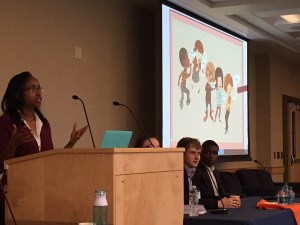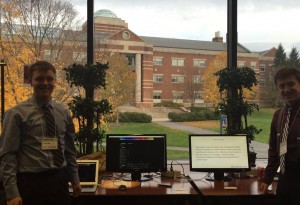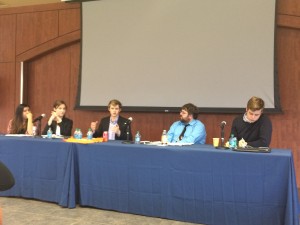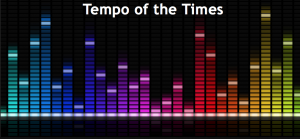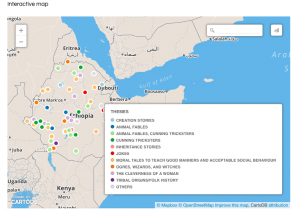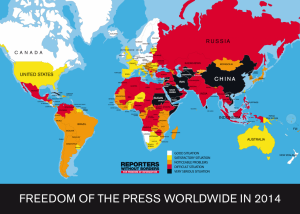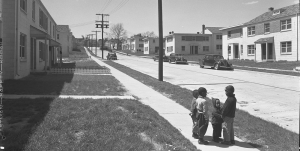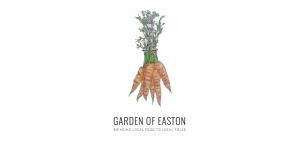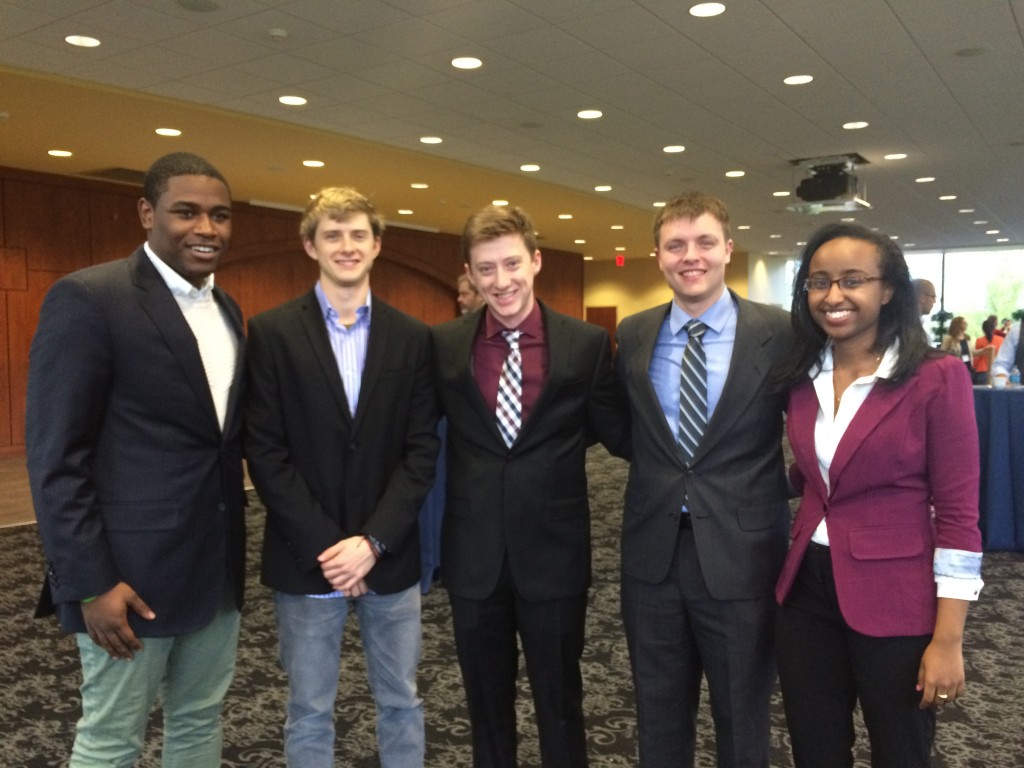
Jethro Israel, Ian Morse, Ben Draves, Vincent DeMarco and Feevan Megersa at the Bucknell Digital Scholarship Conference.
This weekend five Lafayette students presented their work at Bucknell University’s Digital Scholarship Conference, “Collaborating Digitally: Engaging Students in Public Scholarship.” The main focus of the conference was on building new ways to connect Digital Humanities and Digital Scholarship with the student experience and on developing new frameworks for including students as meaningful collaborators on digital projects. While many of the presenters focused on students as researchers or contributors to larger projects, our students presented work of their own design.
Feevan Megersa ’17, Ian Morse ’17, and Jethro Israel ’16 presented their work on a panel “Models of Student Engagement in DH” alongside of the Library’s Postdoctoral Fellow in Digital Humanities Emily McGinn. Feevan presented her project “Got Folktales?” an interactive project that maps the themes and morals of a collection of Ethiopian folktales, and Ian presented work from his Solution Based Press Freedom Project. Both projects were developed as part of the Digital Humanities Summer Scholars program. The internship was sponsored by Skillman Library and supported with funding from the Library’s Andrew W. Mellon Grant for Digital Initiatives.
Jethro discussed his history with the McDonogh Project, a digital project that tells the story of Washington Watts McDonogh and David Kinney McDonogh, two emancipated slaves who were educated at Lafayette in the 1830s. Jethro described his trajectory as he moved from a student working on a class project, to an EXCEL scholar creating and managing the data behind the digital exhibit, to developing his own research interests in relation to the larger project.
Vincent DeMarco ’18 and Ben Draves ’17 were a part of their own separate panel where they presented their project Tempo of the Times, a data analysis project also developed in the Summer Scholars program that examines key features of popular music including polarity, “hotness” and danceability against economic data over time. They were also asked to present their work during the poster session during which they were able to do live demos of their interactive graphs and predictive models that anticipate future trends in music.
Ian Morse was also given a second opportunity to present his work at the conference. He was selected as part of the NextGen Plenary session in which a panel of five early career scholars presented their work to the entire body of conference goers. Ian presented his project that used large scale text analysis to investigate press freedom violations surrounding Turkey’s Gezi Park protests. His work dovetailed perfectly with keynote speaker Micki Kaufman’s methods on text analysis on Henry Kissinger’s correspondence.
Lafayette College was well represented with one of the largest contingents of students, all of whom had produced exceptional work that set the standard for undergraduate research in the digital humanities. They showed a professionalism and dedication to their work that stands as a testament to the culture of research and intellectual curiosity at Lafayette. During the course of the conference, all of our students became valuable resources for their peers as well as to faculty and administrators hoping to replicate their same success at other institutions.
To continue to build a community of practitioners and collaborators here at Lafayette, we will be holding a general interest session Wednesday December 2 in the tech lounge (Pardee 28) from 3-5. Our students will be available to talk more about their projects and are hoping to find students interested in starting their own digital projects and collaborating with them in the future. Drop in anytime between three and five.
For more information contact Sarah Morris, Research and Instruction Librarian at morrisse@lafayette.edu.

